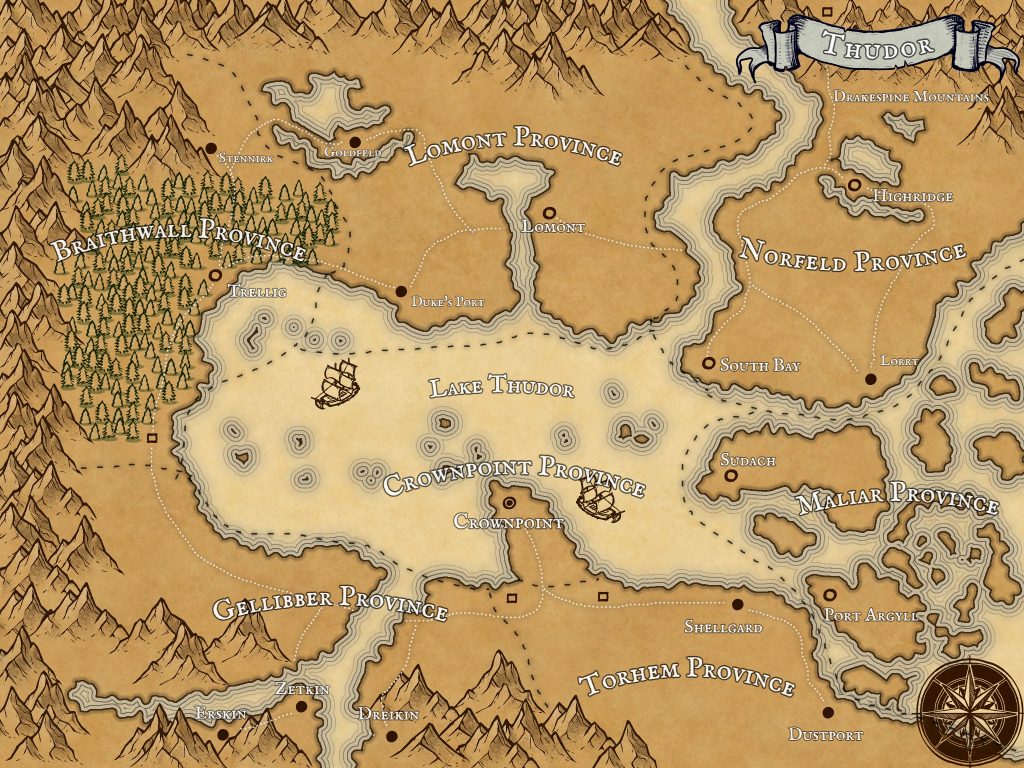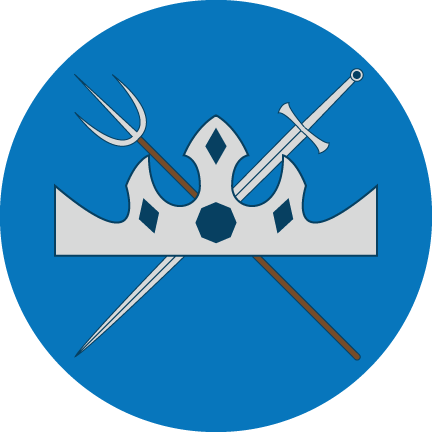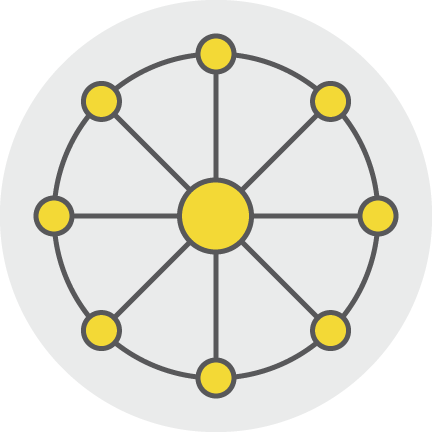The World
Welcome to Thudor

The beginning of Thudor’s history began 327 years ago, when the peoples inhabiting the shores of Lake Thudor were divided into multiple smaller nations. Thorril Medarli, King of Norfeld, dreamed of unifying the region under his rule. Upon taking his throne, he set about a campaign of conquest and diplomacy that eventually annexed all the nations of the lake. Each nation was able to retain some of its cultural identity, but all were assimilated into Thorril’s grand kingdom of Thudor.
Divisions were still rife within the kingdom, however, which culminated into a brutal civil war thirty years ago. The king at the time, Pollus Medarli, was a tyrant in every sense of the word. He regularly abused his powers to feed his desires without regard for his subjects. Tensions soon rose to their breaking point, encouraging rebellious provinces to revolt against the king. Pollus, naturally, sent armies to crush the nascent resistance, but they were stronger than he expected, leading to full-scale war.
Furthermore, Pollus found himself against an unexpected enemy, his younger sibling, Sheren. Unlike their brother, Sheren understood a monarch with unchecked power would lead to disaster, and promised great reforms should they seize the throne. These promises rallied the forces opposing Pollus around them, and after three years of bloodshed, Pollus was overthrown and bound in chains. Sheren was crowned Monarch and began the process of rebuilding the kingdom.
Thus began what is now called Thudor’s “Age of Enlightenment.” Monarch Sheren came through with their reforms and created the High Assembly, a legislative body where people across the provinces can elect representatives to the government, and therefore have a voice. The economy was also liberalized, empowering trade guilds and increasing commerce to levels beyond those from even before the Thudorian Civil War. Combined with advancements in magic and science, the kingdom prospered from an economic boom.
Unfortunately, not everyone benefits from this newfound prosperity. Many people lost their livelihoods in the Civil War, and as wealth continues to flow into the hands of a few, the number of disadvantaged is only increasing. Furthermore, rapid industrial expansion has created a strain on existing resources, leading to concerns of an economic crash.
On top of that, problems are arising on the diplomatic stage as well. To the north, the nation of Ithrana’s links to the Feywild have collapsed, resulting in a civil war between its feuding nobles. Thousands of Ithranan refugees have already fled to Thudor, concerning those already worrying about Thudor’s economic fragility. Meanwhile, to the south, the clans of Vailor have elected a new, militaristic Onyx Lord and closed their borders. Thudor’s leaders fear this is a prelude to an invasion.
The combined crises have led to the rise of multiple factions within Thudor, each with their own idea of how to navigate the kingdom through these difficult times. Although they scheme against each other for influence, there are champions among them who seek to prevent another conflict between Thudorians. Can those champions come together and lead Thudor away from catastrophe?
Factions
The High Assembly

Created through Monarch Sheren’s reforms after the Thudorian Civil War, the High Assembly is the legislative branch of Thudor’s government meant to balance the power of the monarch and give ordinary Thudorians a voice in politics. It is a bicameral structure, with its representatives divided into two bodies. The Hall of Nobles consists of the many nobles that administer regional governments, while the Hall of Commons is made of officials directly elected by Thudor’s populace. The Assembly is headed by a prime minister chosen by the monarch.
While representatives of either body are the most public-facing individuals of the High Assembly, there are plenty of other people considered “members of the High Assembly” who don’t participate in its legislation. This applies to anyone in a government position who works to support the Assembly and state, such as diplomats, aides to representatives, high-ranking military officials, and more.
The actual ideological affiliations of High Assembly members are wide-ranging. Many members support the liberal policies of Monarch Sheren, while plenty others support more conservative policies, or even ideas propagated by other factions. What unites them all is a belief in the new kingdom of Thudor where everyone can speak their mind, and if changes need to be made, they can be achieved through reform and compromise.
The leader of the High Assembly is Prime Minister Josefine Nielsen. Originally a commoner from Braithwall Province, Josefine was already a rising star in the military when the Civil War began. She was one of the leading voices arguing for Braithwall to join Sheren Medarli’s side, claiming Braithwall can gain equality through their reforms. Her performance in the war outpaced most officers, so much so that when the war ended, Monarch Sheren granted her a noble title in Braithwall, earning her a place in the Hall of Nobles.
Since then, Josefine has gained great respect within and outside the High Assembly and held the position of prime minister for six years. Her experience in the military and politics taught her how to navigate all social circles, in which she utilizes both her charisma and commanding presence to get things done. Sometimes the bureaucracy irritates her, but she knows it’s a necessary burden to ensure the people of Thudor’s safety.
The Ivory Conclave

Since before Thudor’s inception, the sailing ships of merchants’ guilds have transported goods from one end of Lake Thudor to the other. Profits were hit hard during the reign of King Pollus and the ensuing civil war, but with the advent of peace and the new government, an opportunity arose for the guilds. To protect free trade in this new age, three powerful families–Nemari, Loomis, and Calaski–formed the Ivory Conclave. Originally an alliance between their guilds, the Conclave has since expanded to encompass many industries.
The Ivory Conclave has its origins in logistics and trade, and thus many of its members are the merchants, caravaneers, ship captains, and administrators that run them. However, many different businesses have eyed the wealth of the Conclave and joined the alliance, bringing their services and trades into the fold. Members now include a variety of industrial magnates, mercenaries, and even wizards, who see the Conclave’s interest in innovation as an opportunity for advancement in magical arts.
While the Conclave is happy with the recent economic reforms enacted by the Monarch, members still want to expand further. They see constant economic and technological progress as the key to solving Thudor’s issues and believe they have the ability to provide it. Government bureaucracy is often seen as a hindrance, especially with the old noble families who repeatedly clash with merchants’ interests. This has led many Conclave members to support a transition of Thudor into a republic, where bloodlines and nobility are erased to allow for anyone to socially advance.
There is no one leader that directs the Conclave’s operations. However, one only needs to follow wealth to see who has the power, and there is no one in the Conclave wealthier than Cascade Nemari. The water genasi daughter of Lucan Nemari, one of the Conclave’s founders, Cascade inherited her father’s shipping lines, as well as his business aptitude. She always wears a kind smile and warm demeanor when negotiating. At the same time, however, she makes quiet calculations, trying to find advantages to exploit and further the interests of her family, and by extension, in her mind, the Conclave.
The Order of Stone

The religion of Thudor is vert decentralized, with multiple sects worshiping various nature spirits and Titans. The largest sect is the Order of Stone, devoted to Indusius, an earth Titan of loyalty and devotion. The Order has enjoyed a fair amount of influence in Thudor since its founding. With the end of the Civil War and the rise of modernity, though, the Order’s influence has been waning. To regain its lost glory, its leaders have begun expanding the Order, absorbing other sects of Thudor’s faithful and spreading their own teachings throughout society.
A structured hierarchy dictates the inner workings of the Order. At the top is the Colossus, the absolute leader of the Order and all its holdings. When a Colossus dies, a new one is elected by the Prelates, a council of elite spiritual leaders, each of which oversees a province in Thudor. Beneath them are Priors, who oversee cities and towns. Abbots, meanwhile, lead individual temples and shrines, and directly interact with the Order’s followers most often.
While the ideas of the Order’s lower ranks may differ, the overall goal of the Order is to restore its position of prominence in Thudorian society. In its leaders’ eyes, the recent shift toward unrelenting progress and abandonment of spirituality has caused the problems plaguing Thudor today. The Order must spread its ideas to all Thudorians, promoting an orderly life where prosperity is earned through worship and the respect of authority. While some in Thudor see these ideas as tyranny, there is a genuine feeling of brotherhood within the Order’s ranks, and Abbots regularly work with their communities to improve people’s well-being.
The current Colossus of the Order is Colossus Mular, who has held his position for over fifty years. He has led his followers through the Civil War, during which he sided with Sheren Medarli after witnessing firsthand just how cruel King Pollus was. Now, however, he somewhat regrets that decision. He’s no supporter of Pollus, but he sees the reforms of Monarch Sheren as the cause for Thudor’s current ills and seeks to rectify his mistake by enforcing the Order’s ideas. Mular regularly travels the kingdom to meet with religious and political leaders in hopes of building a network to provoke the change he desires.
In smaller meetings, Mular is known to be quiet and of few words. He is not inattentive though. In fact, he is always listening and observing, calmly taking in every bit of information. His real zeal is more prominent during larger convocations, during which he instills his audiences with the passion and loyalty he professes to his faith.
The Knights of the Soil

While Thudor as a whole prospers from its booming economy, not everyone shares its wealth. Driven by profit, industries exploit the land and expose their workers to dangerous conditions. One day, however, a mysterious man named Bren inspired miners across Gellibber province to revolt, forcing concessions from their employers. Bren later disappeared, but his ideas of equality and communal action prompted common folk across Thudor to form the Knights of the Soil, dedicated to protecting the disadvantaged and enacting radical change.
Wherever there are workers, the Knights of the Soil have a presence. As such, members come from all sorts of backgrounds. There are plenty of hard-working folk like miners, farmers, and sailors.. Organizing protests and other collective actions can turn members into leaders, writers, and sometimes bards. Members from Braithwall province also make up a bulk of members, which leads to a good number of druids and rangers seeking to protect the land.
As a whole, the Knights of the Soil believe in egalitarianism. Wealth, family, nationality, faith, and other similar backgrounds shouldn’t determine your status in society, and if the government won’t enforce that, the people need to enforce it themselves. Additionally, a large number of Braithwall members has led to the Knights adopting land protection into their creed. An attack on the natural world is an attack on the people.
However, the Knights have made a lot of enemies. To counteract this, the Knights maintain a decentralized structure with each disparate group staying in their own city or town. While this keeps the larger movement safe, each group develops their own ideals and methods of implementing them, which may lead to infighting.
The most prominent figure within the Knights of the Soil is Horbin Highmeadow, a halfling man from the mining town of Zetkin. A miner during Bren’s Revolt, Horbin claims he knew Bren personally, although nobody knows if he’s telling the truth. In any case, his history with the movement has given him a lot of clout, and while he’s based in Zetkin, he cooperates with his kin across Gellibber Province. In negotiations, he often seems distracted, uncaring even, but this is simply a front. More often than not, he is the most attentive person in the room, looking for any way to strengthen the Knights.